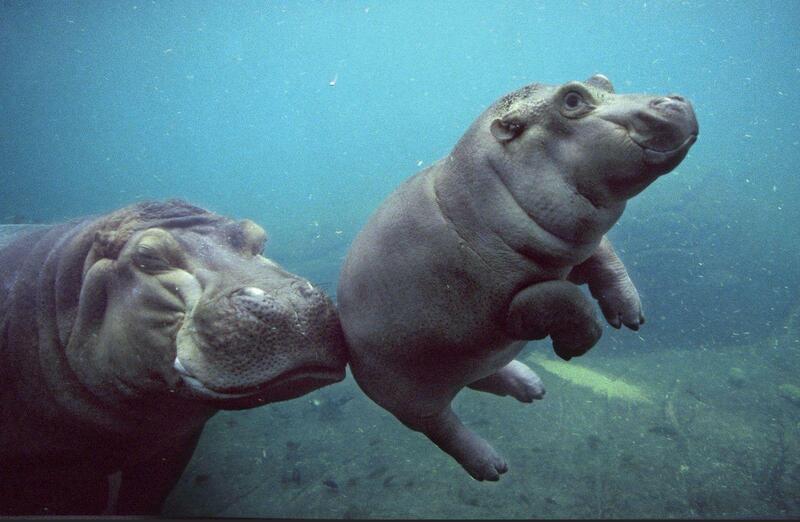Hippopotamuses, commonly known as hippos, are fascinating creatures that have long intrigued humans due to their size, unique habitat, and behaviors. While hippos spend much of their time in water, a common question arises: can hippos swim? The answer may surprise you. Despite their close association with rivers and lakes, hippos don’t actually swim in the traditional sense. In this article, we will explore the truth about hippos' aquatic abilities, their adaptations to water, and why they are often mistaken for swimmers.

Though hippos spend a significant portion of their lives in the water, they do not swim like other aquatic animals. Unlike animals such as fish, otters, or crocodiles that propel themselves through the water using their limbs, hippos don’t actually swim. Instead, they walk or gallop along the riverbed or lakebed.
Hippos have a remarkable way of moving underwater. They use their massive legs to push off from the bottom of the water body, propelling themselves forward with a walking or bounding motion. Their dense bodies, unlike many aquatic animals that have air sacs or buoyancy aids, naturally sink, making it easier for them to stay near the bottom.
Though hippos can't swim in the traditional sense, they’ve adapted incredibly well to their aquatic environment. Here’s how hippos move and survive in water:
As mentioned earlier, hippos use their feet to "walk" along the bottom of rivers or lakes. In deeper waters, they push off the bottom with their powerful legs and glide through the water before touching down again, creating a galloping-like motion.
One of the key reasons hippos don’t swim is their dense, heavy bodies. An adult hippo can weigh between 1,500 and 4,000 pounds, meaning they are not buoyant enough to float. Their dense bodies are perfect for moving along the bottom, as this weight helps them stay grounded in their watery environment.
Hippos can hold their breath for extended periods, usually between 3 to 5 minutes, allowing them to remain underwater for long stretches without needing to resurface for air. This ability is essential for an animal that spends much of its time submerged in rivers and lakes.
Hippos' eyes, ears, and nostrils are positioned on the top of their heads, allowing them to breathe and keep an eye on their surroundings while the rest of their body remains submerged. This adaptation helps hippos stay alert to predators or threats, even when they’re mostly underwater.
Though hippos aren’t active swimmers, their movement in water is surprisingly energy-efficient. By walking or bounding along the riverbed and using the water’s buoyancy, they conserve energy. This is vital for an animal that spends hours each day submerged, especially during the heat of the day.
Hippos are semi-aquatic animals, meaning they split their time between water and land. Their close association with water plays a significant role in their daily lives and survival.
One of the primary reasons hippos spend so much time in water is to keep cool. Hippos lack sweat glands, so being submerged in rivers or lakes allows them to regulate their body temperature, especially in the hot climates of sub-Saharan Africa, where they are most commonly found.
Hippos have another remarkable adaptation: they secrete an oily substance known as "blood sweat." This secretion not only acts as a sunscreen, protecting them from the sun’s harmful rays but also has antibacterial properties, helping them avoid infections. However, being in the water provides additional protection from the sun.
While adult hippos have few natural predators due to their size, they are still vulnerable on land, especially young calves. Water offers a safer refuge where they can avoid being attacked by land predators like lions and hyenas. When submerged, their massive size and aquatic adaptations make them hard to challenge.
Hippos are highly social animals, and their groups, known as "pods" or "bloats," are typically found in water. Males are territorial and often compete for dominance in the water. Mating also occurs in water, where the male and female hippos have greater stability and support due to the buoyant environment.
The misconception that hippos are strong swimmers likely comes from their water-dwelling lifestyle. While hippos may not swim in the traditional sense, their ability to move through water in their unique way is just as impressive. Here’s why:
Though they don't swim, hippos can move quite quickly through water. Using their bounding and walking techniques, they can reach speeds of up to 8 kilometers per hour (5 miles per hour) underwater. This speed, coupled with their size and strength, makes them formidable creatures even in the water.
Hippos are often mistaken for sluggish animals due to their bulky size. However, despite their large frames, they can move surprisingly fast on land, reaching speeds of up to 30 kilometers per hour (19 miles per hour). This speed, combined with their aggressive temperament, makes them one of Africa’s most dangerous animals.
Hippos are built for water life, and while they don’t swim, their lifestyle revolves around being submerged. Their skin, nostrils, ears, and body weight are all adapted to aquatic conditions, allowing them to live comfortably in both land and water environments.
While the short answer is no, hippos don’t swim in the traditional sense, they are exceptional movers in water. Their ability to walk, push off, and gallop along the river or lakebed showcases how perfectly adapted they are to their semi-aquatic lifestyle. Hippos have evolved to thrive in water, even without the ability to float or paddle like many other animals.
Hippos are fascinating creatures, combining strength, size, and aquatic adaptation in ways that make them unique in the animal kingdom. Their misunderstood swimming abilities only add to the allure of these mighty mammals, as they continue to dominate the rivers and lakes of Africa.
animal tags: hippos
We created this article in conjunction with AI technology, then made sure it was fact-checked and edited by a Animals Top editor.